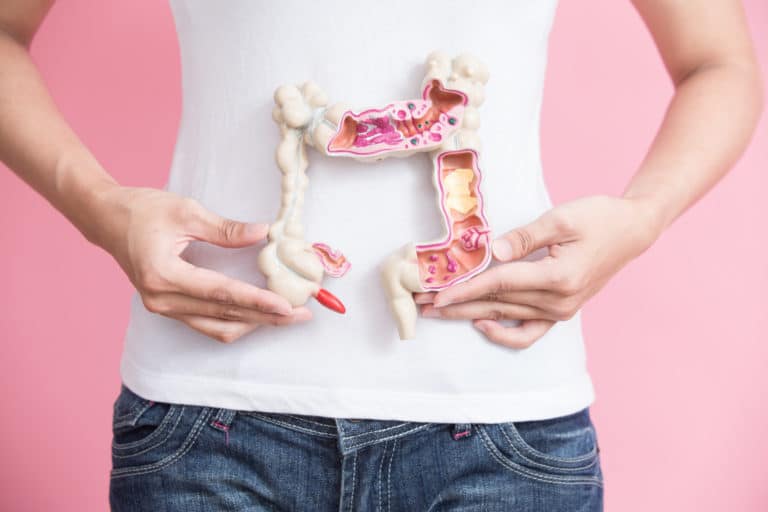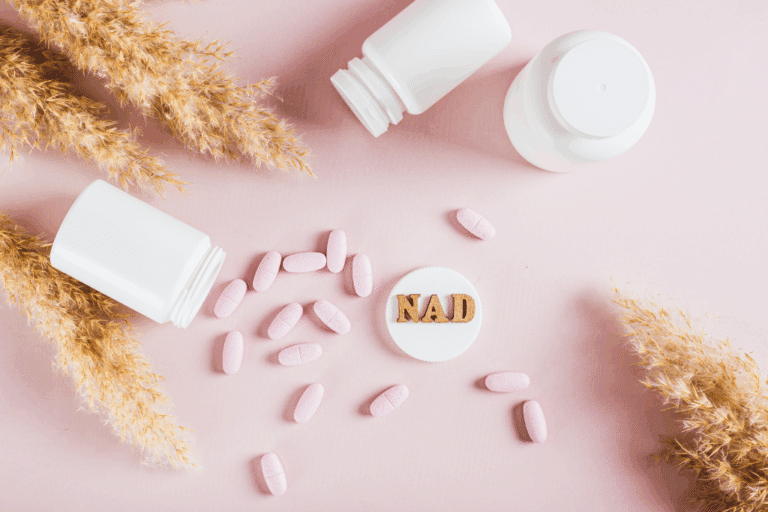Hormones may be the last thing on your mind when you’re considering ways to improve your gut health, but the relationship between the two is very important for your overall health. As you’ve entered perimenopause, you may have noticed more bloating, IBS symptoms, constipation, or diarrhea.
Poor digestive health can cause increased levels of estrogen in our bodies because of high levels of beta-glucuronidase which “un-packages” estrogen that’s been processed for elimination through bowel movements. Sluggish thyroid? That makes the rest of your body sluggish too (including the bowels). Stressed? High levels of cortisol activate fight/flight/freeze response which slows down digestion. It’s easy to see how things can get off course! And for any woman looking to keep a healthy body well into menopause, understanding the relationship between your gut and hormones is absolutely critical.
Signs of an Unhealthy Gut Include:
- Digestive issues (bloating, gas, diarrhea, or constipation)
- Weight changes
- Food sensitivities
- Fatigue
- Skin irritation (yep, it’s true)
- Autoimmune conditions
- Hormone imbalance
The road to a healthy body starts with healthy habits and proper nutrition. A health study published in the Nutrients Journal highlights the important role that the gut microbiome plays in the prevention of chronic diseases, from metabolic conditions to gastrointestinal disorders.
[bctt tweet=”The road to a healthy body starts with healthy habits and proper nutrition. #guthealth #GIMap #perimenopause #menopause #hormones #bloating #GIhealth #gutmicrobiome #estrobolome #DrAnnaGarrett #AnnaGarrettAsheville” username=”DrAnnaGarrett”]
How to Love Up Your Gut
- Ditch the sugar. Sugar, especially artificial sweeteners, have the tendency to contribute to the imbalance of gut microbes. This can overwhelm the good bacteria and cause digestive issues. If you find yourself craving sweets, then it’s best to stick to naturally sweet foods like fruit.
- Another way to improve your gut health is by taking prebiotics and probiotics (use the code: DrAnna to order). Prebiotics feed the good bacteria. The addition of healthy bacteria via probiotics can aid the breakdown of food. Fermented foods such as kefir and soybeans, as well as yogurt, kimchi, and pickled vegetables, are all naturally rich in healthy gut bacteria. However, if you suspect SIBO, fermented foods and some probiotics can make this worse. Look for a soil-based probiotic. These generally have multiple bacillus strains in them. The type of probiotics used should also be rotated every 3-4 months to prevent overgrowth of the supplemented microbes.
- Consider food sensitivities. New ones can pop up during midlife and result in intestinal inflammation. You can get more information on that here: https://drannagarrett.com/food-sensitivity-testing/
- Mind your meds. Gut health is negatively impacted by some medications including stomach acid reducers (PPIs), metformin, birth control pills, and hormone replacement therapy.
- Develop good eating hygiene habits. What does this mean? Chewing your food well, limiting liquids during meals, eating mindfully, and stopping when you are 80% full.
Conclusion
An unhealthy estrobolome (the microbes that help process estrogen) can contribute to higher levels of estrogen and more problems with estrogen dominance during perimenopause and menopause. The more your symptoms fluctuate, the more you should be paying attention to your gut health. Notice the effect that different foods have on your GI tract and how your hormone symptoms come and go. Food and/or symptom journal can help sort this out. Consider testing like the GI Map test or food sensitivity testing to identify root causes of GI distress. Please email info@drannagarrett.com if you’d like more information about these tests.
Dr. Anna Garrett is a menopause expert and Doctor of Pharmacy. She helps women who are struggling with symptoms of perimenopause and menopause find natural hormone balancing solutions so they can rock their mojo through midlife and beyond. Dr. Anna is the author of Perimenopause: The Savvy Sister’s Guide to Hormone Harmony. Order your copy at www.perimenopausebook.com.
Dr. Anna is available for 1-1 consultations. Find out more at www.drannagarrett.com/lets-




